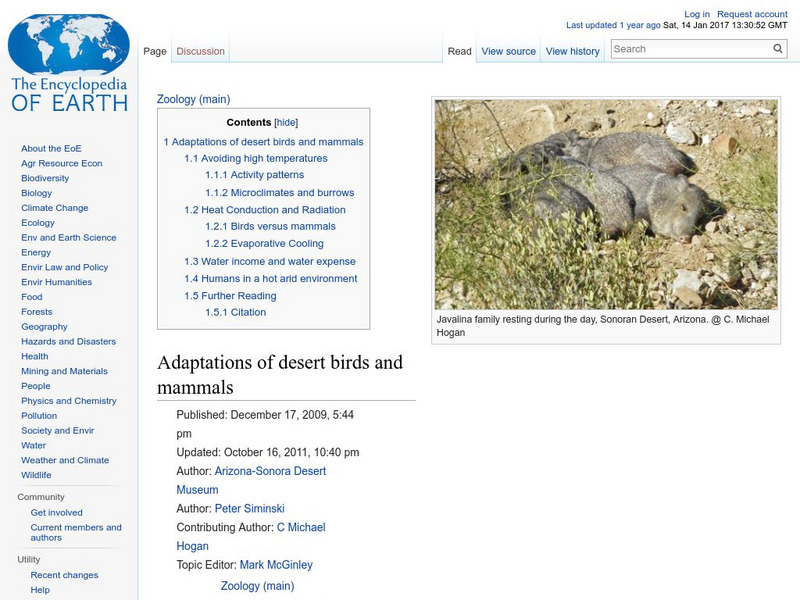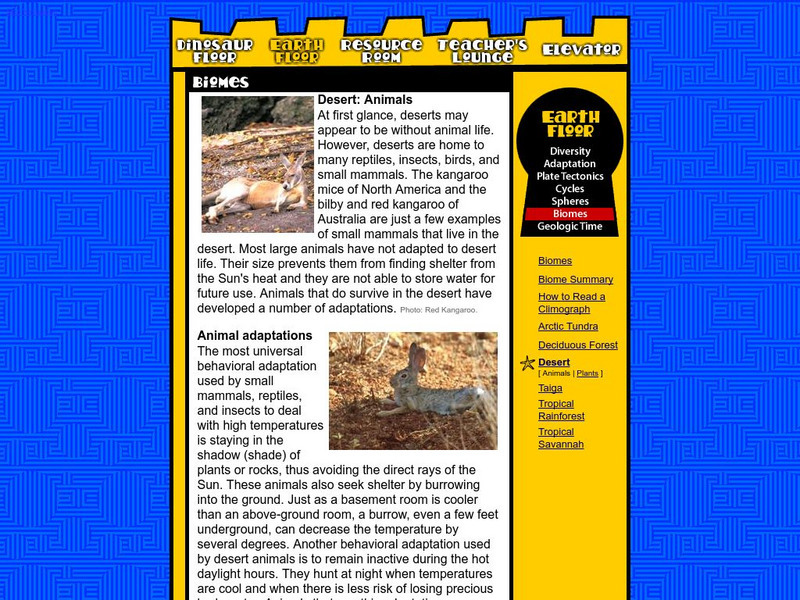Science Struck
Science Struck: Grassland Animal Adaptations
Learn about the different animals that live in tropical and temperate grasslands and how they have adapted to their environment. Also discusses some plant adaptations.
PBS
Pbs Learning Media: Total Solar Eclipse Animation
This brief animation adapted from NOVA illustrates how total solar eclipses form and explains the stages from first contact to totality. [1:14]
Encyclopedia of Earth
Encyclopedia of Earth: Adaptations of Desert Birds and Mammals
The ways in which animals have adapted so as to survive in a desert environment are described in this article. Mechanisms that humans have to help them cool themselves in a desert are also explained. (Published: December 17, 2009)
San Diego Zoo Global
San Diego Zoo: Animal Bytes: Pelicans
An in-depth description of pelicans, including their classification, appearance, habitat, adaptations, reproduction, diet, and other interesting facts. Also includes pictures and video.
ArtsNow
Arts Now Learning: Proficient Puppeteers
In this lesson, students create puppets for the characters in a Reader's Theater script called 'Georgia State Animals & Plants: Habitats and Adaptations.' The puppets showcase the adaptations for each plant or animal. Students then...
Annenberg Foundation
Annenberg Learner: Journey North: Adaptations: Fit for Survival
This lesson plan will help students explore adaptation, especially as it relates to migration. Students will come to realize that adaptations can be behavioral as well as physical. Students are assigned a particular animal to investigate...
Better Lesson
Better Lesson: Survival of the Fittest
Fins, gills, claws, wings, each has a special purpose in helping an animal to survive. Students will look at how animals have different parts that help them to adapt to their habitat, and to avoid predators or capture prey. Included in...
PBS
Pbs Learning Media: Animal Coverings
It takes a thick skin to withstand the hardships that life has to offer. This collection of images shows a variety of animals, each with a slightly different type of protective covering.
Center for Educational Technologies
Earth Floor: Desert Biome: Animals
Site provides information on desert animals and animal adaptations. Offers links to desert plants and their adaptations, other biomes, and more.
PBS
Pbs Learning Media: Seeing Through Camouflage
This interactive feature from the NOVA: "Leopards" Web site presents a wide variety of ways in which animals use coloration to their advantage.
PBS
Pbs Learning Media: Shark Attack! The Hunt
This interactive module from the NOVA: "Shark Attack!" web site details the six senses that sharks use to find and capture their prey.
PBS
Pbs Learning Media: Bird Food and Bird Beaks
There are almost as many types of bird beaks as there are types of food that birds like to eat. This collection of images shows a wide range of beaks and the types of foods handled by each.
PBS
Pbs Learning Media: Bird Beak Gallery
This collection of images of ten different birds illustrates the diversity of bird beaks.
Environmental Education for Kids
Eek!: Under in the Mud Read Aloud | Story Edventures
Under in the Mud by Laureanna Raymond-Duvernell takes you into the wintering world of ten Wisconsin animals as you listen to her read the book and talk about the animals in it. Learn about how animals hibernate, migrate, and adapt to...
Society for Science and the Public
Science News for Students: Wet Dog Physics
Describes the physics behind animals' ability to dry themselves by shaking to remove water.
PBS
Nova: Dogs Around the World
Play an interactive game where you can match modern dog breeds with the country in which they originated.
PBS
Pbs Learning Media: Atmospheric Oxygen
In this feature, adapted from Interactive NOVA: Earth, students explore the relationship between oxygen concentration and the well-being of various organisms by simulating a change in oxygen levels and observing what happens.
PBS
Pbs Learning Media: Mitosis
This video segment, adapted from the Interactive Secret of Life videodisc, explains the stages of mitosis, the process of dividing equally a cell's massive jumble of DNA just prior to cell division. [1:34]
PBS
Pbs Teachers:mediterranean on the Rocks: Turtle Hospital
Research how people affect animal populations by introducing alien species, which endanger endemic species. Map how the imported red fire ant expanded its range in the U.S. since the 1920s, and investigate the impact this alien has on...
Science Buddies
Science Buddies: Make a Miniature Habitat
Hands-on lesson plan in which students use mostly natural materials to build a shoebox habitat that mimics a real-life habitat for an animal of their choice.
Denver Zoo
Denver Zoo: Cape Buffalo
The Denver Zoo features a comprehensive overview of the cape buffalo focusing on its habitat, range, adaptations, diet, physical characteristics, and more.
Center for Educational Technologies
Earth Floor: Biomes: Deciduous Forest: Animals
Site contains information on deciduous forest animals and animal adaptations. Offers links to biomes, a biome summary, how to read a climograph, arctic tundra and more.
Science Buddies
Science Buddies: What Are You Blubbering About?
Baby Beluga may swim in the deep blue sea, but the song doesn't mention how cold it is out there. Find out in this short project how a bit of blubber can be a useful adaptation when the water is ice cold.
Lincoln Park Zoo
Lincoln Park Zoo: Barn Owl
An excellent account of the Common Barn Owl. This site provides information on the owl's description, status, habitat, niche, life history, as well as facts on special adaptations they have acquired.
Other popular searches
- Ocean Animal Adaptations
- Fantasy Animal Adaptations
- Plant and Animal Adaptations
- Animal Adaptations Behaviors
- Animal Adaptations +Wetlands
- Animal Adaptations Wetlands
- Animal Adaptations Eating
- Desert Animal Adaptations
- Animal Adaptations to Cold
- Animal Adaptations and Math
- Oceanic Animal Adaptations
- Animal Adaptations Oceans











